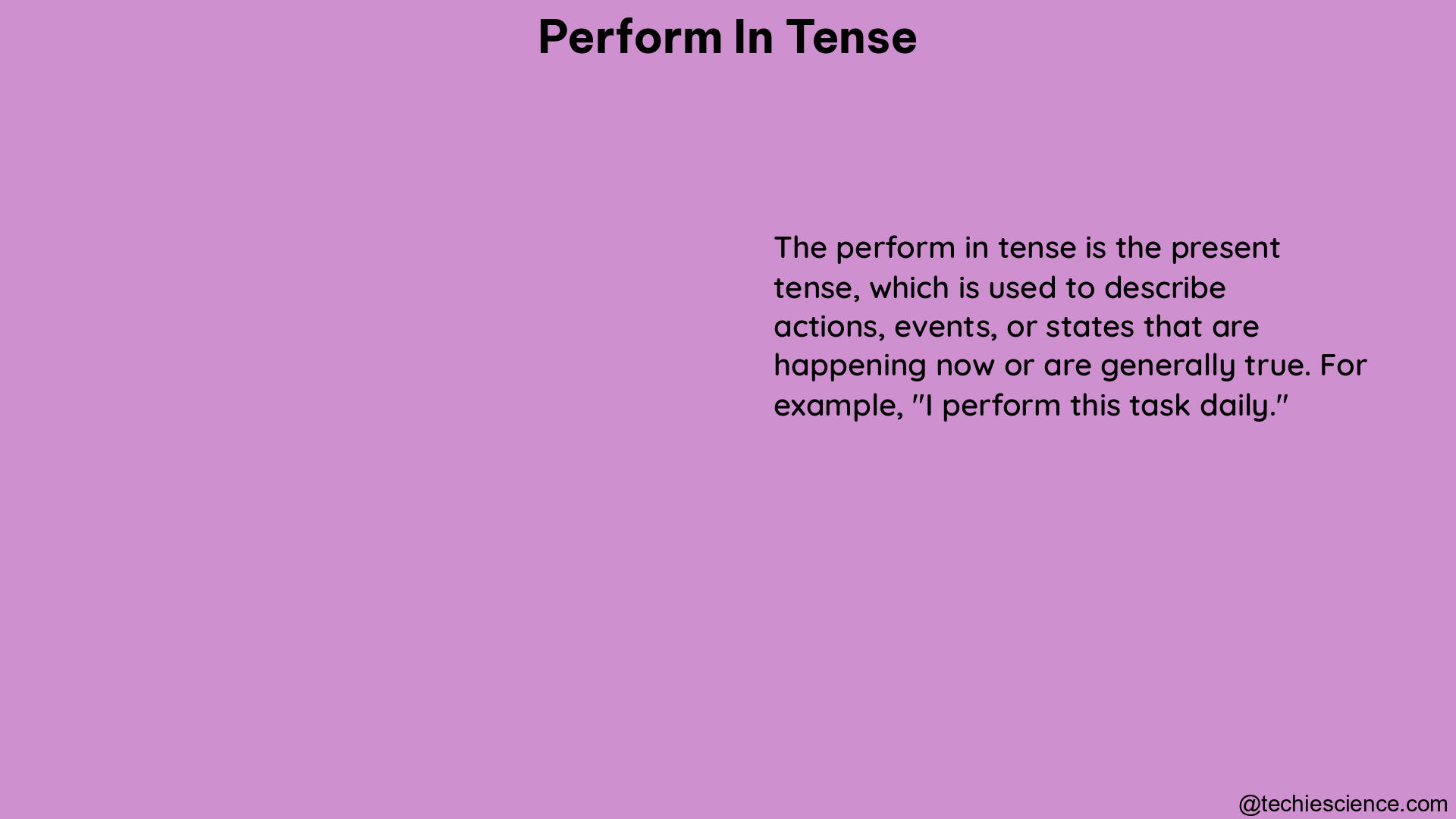The verb “perform” is a crucial component of English grammar, and understanding its various forms in different tenses is essential for effective communication. This comprehensive guide will delve into the conjugation of “perform” in diverse tenses, providing detailed explanations and practical examples to help you master this essential verb.
Present Tense
Simple Present
- I perform
- You perform
- He/She/It performs
- We perform
- You perform
- They perform
The simple present tense is used to express habitual actions, general truths, or actions that occur in the present moment. For example, “The dancer performs on stage every weekend.”
Present Continuous
- I am performing
- You are performing
- He/She/It is performing
- We are performing
- You are performing
- They are performing
The present continuous tense is used to describe an ongoing action or event happening at the present time. For instance, “The orchestra is performing a new symphony tonight.”
Past Tense

Simple Past
- I performed
- You performed
- He/She/It performed
- We performed
- You performed
- They performed
The simple past tense is used to describe actions or events that occurred in the past. For example, “The band performed at the music festival last weekend.”
Past Continuous
- I was performing
- You were performing
- He/She/It was performing
- We were performing
- You were performing
- They were performing
The past continuous tense is used to describe an ongoing action or event that was happening in the past. For instance, “The dancers were performing a traditional routine when the lights went out.”
Past Perfect
- I had performed
- You had performed
- He/She/It had performed
- We had performed
- You had performed
- They had performed
The past perfect tense is used to describe an action or event that occurred before another past event. For example, “By the time the curtain opened, the actors had performed their final rehearsals.”
Future Tense
Simple Future
- I will perform
- You will perform
- He/She/It will perform
- We will perform
- You will perform
- They will perform
The simple future tense is used to describe an action or event that will occur in the future. For instance, “The band will perform at the music festival next month.”
Future Continuous
- I will be performing
- You will be performing
- He/She/It will be performing
- We will be performing
- You will be performing
- They will be performing
The future continuous tense is used to describe an ongoing action or event that will be happening in the future. For example, “The actors will be performing in a new play next season.”
Future Perfect
- I will have performed
- You will have performed
- He/She/It will have performed
- We will have performed
- You will have performed
- They will have performed
The future perfect tense is used to describe an action or event that will be completed before another future event. For instance, “By next year, they will have performed in over 20 countries.”
Conditional Tenses
Conditional
- I would perform
- You would perform
- He/She/It would perform
- We would perform
- You would perform
- They would perform
The conditional tense is used to describe an action or event that would occur if certain conditions were met. For example, “If I were you, I would perform in front of a smaller audience.”
Conditional Perfect
- I would have performed
- You would have performed
- He/She/It would have performed
- We would have performed
- You would have performed
- They would have performed
The conditional perfect tense is used to describe an action or event that would have occurred if certain conditions had been met in the past. For instance, “If they had performed better, they would have won the competition.”
Imperative
Imperative
- Perform (singular and plural)
The imperative mood is used to give commands or instructions. For example, “Perform the piece with more emotion.”
Examples
Here are some additional examples of the verb “perform” in various tenses:
- Simple Present: “She performs at the theater every night.”
- Present Continuous: “The orchestra is performing a new symphony tonight.”
- Simple Past: “The team performed well in the championship.”
- Past Continuous: “The dancers were performing a traditional routine when the lights went out.”
- Past Perfect: “By the time the curtain opened, the actors had performed their final rehearsals.”
- Simple Future: “The band will perform at the music festival next month.”
- Future Continuous: “The actors will be performing in a new play next season.”
- Future Perfect: “By next year, they will have performed in over 20 countries.”
- Conditional: “If I were you, I would perform in front of a smaller audience.”
- Conditional Perfect: “If they had performed better, they would have won the competition.”
By mastering the conjugation of the verb “perform” in various tenses, you will be able to communicate more effectively and accurately in English. Remember to practice using these forms in your own writing and speaking to solidify your understanding.
References
- PONS Verb Tables: Comprehensive conjugation tables for “perform” in various tenses.
- Preply: Detailed explanations and examples of the past tense of “perform”.
- Reverso Conjugator: Advanced conjugation details for “perform” including continuous and perfect tenses.
- Simple English Wiktionary: Basic conjugation and pronunciation details for “perform”.
- Bab.la: Conjugation tables and translations for “to perform”.
Hi… I am Sowndharya Jagadeeswaran, a university rank holder in M.A. English Literature. I have also done my master’s in Business Administration. Inquisitive as I am, my interest in action-oriented research helped me publish research papers in reputed journals. Now, as a career, I am an instructor where I teach young and adorable students the intricate technicalities of Public Speaking and Creative Writing. I also enjoy writing articles on topics I specialize and research in.
You can connect with me through LinkedIn.-